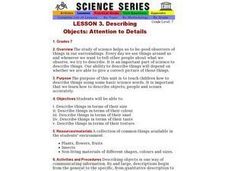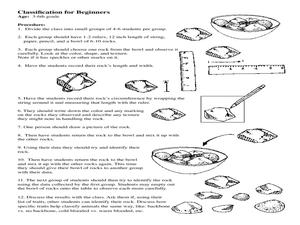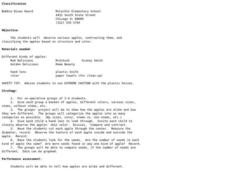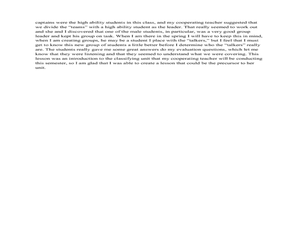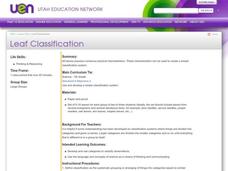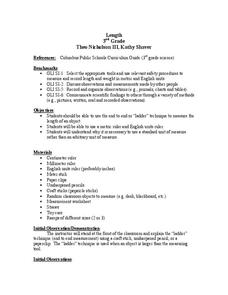Curated OER
Describing Objects: Attention to Details
Seventh graders study how observation and accurate descriptions are an important in science. They use basic science words in their descriptions.
Curated OER
Observation Zooming
Sixth graders use zoom lenses to observe meal worms and draw them from three different zoom levels. They complete their artwork in sketchbook and complete a questionnaire about their abilities as scientific artists.
Curated OER
The Rock Cycle
In this rock cycle activity, students copy the table illustrated for data and observations of rock samples. Then they examine the rock samples observing the characteristics and the arrangement of grains in each. Students then record...
Curated OER
Everything's Under Control
Fifth graders prepare for a "Mad Scientists Fair" by creating a controlled study and by conducting experiments. They make and record observations and classify specimens according to characteristics. They compare results to their original...
Curated OER
Using the senses
Students use their senses to compare a frog and a hamster. In this animals comparison lesson plan, students get into groups and observe, smell, feel, and listen to what their animals are like, and classify them into categories.
Curated OER
Chick Embryology
Students investigate techniques that can be used to observe the development of the chick embryo. They explore the environment in which the chick develops and how it can be manipulated.
Curated OER
Classification for Beginners
Students explore the process of classification. In this rock classification lesson plan, students conduct a scientific investigation that requires them to follow the provided steps to classify rocks.
Curated OER
Classification in Action
Students work with a set of objects to set up both quantitative and qualitative classification systems. As a group, students follow an example to design and complete two classification systems using a set of objects provided. ...
Curated OER
Dendrology
Students work as a class-size unit as well as in small groups to become proficient in observing tree characteristics to facilitate species identification. They identify most common tree species by observing leaf, flower, fruit and bark...
Curated OER
Classification
Students explore classification. In this science lesson plan, students observe various apples, contrasting them, and classifying the apples based on structure and color.
Curated OER
Starches and Fats
Students observe the presence of starches and fats in different foods. In this science lesson plan, students distinguish between a food that contains starch and a food that contains fats, define the terms starches and fats, and classify...
Curated OER
A Fiedl Study of an Integral Species
Young scholars compile baseline population information on a local species. They design and conduct a scientific investigation of a local species. Students interpret, analyze and communicate results based on sound scientific and...
Curated OER
Classifying the Class
Fifth graders create dichotomous keys to create classifications of students in the classroom by writing instructions. In this classifications lesson plan, 5th graders learn how dichotomous keys are used in science observations.
Curated OER
Classification of Animals
Students explore animal characteristics by participating in a SMART board activity. In this animal classification lesson, students utilize a sorting chart to divide different animal names by their observable characteristics. Students...
Curated OER
Leaf Classification
Seventh graders work together to develop a leaf classification system. In groups, they are given a set of leaves and sort them based on their characteristics. They share their new classification system with the class and answer any...
Alabama Learning Exchange
Weather Detectives
Second graders make weather observations and record data. They use the internet to get data on the weather. After 5 days students predict the weather for the next 3 days.
Curated OER
Guess What?!
Students explore how scientists work. In this scientific method activity, students use their senses to identify objects they cannot see. Students are asked to think like scientists and make observations, comparisons, and interferences,...
Curated OER
Classification
In this classification worksheet, students observe the fingerprints provided. Students decide upon a classification system to use to categorize the given fingerprints.
Curated OER
Biodiversity
In this biodiversity activity, students sort and classify animals by their observable features using a dichotomous key. Students then respond to questions about complete and incomplete metamorphosis.
Curated OER
School Yard Park/ Ecosystem
Fifth graders examine ecosystems in their schoolyard. In this nature and ecosystem lesson, 5th graders map their schoolyard into workable plots. They classify plants and animals found in the plot. They revisit their site every two weeks...
Curated OER
In the Field with Salamanders
Students observe salamanders, take pictures of them, and classify them into an online format. In this animal classification instructional activity, students use collection materials and digital camera to photograph and observe...
Curated OER
A Planet Full of Animals
Students study animals and practice classifying them through observation activities. In this animal classification lesson, students complete a KWL chart about animals. Students then sort pictures of animals into chart categories based on...
Curated OER
Creating a Dichotomous Key for Families of Idaho Butterflies
Students are shown how to use the butterfly section of the Digital Altals of Idaho. They discuss how to make a dichotomous key. Students use their skills of observation and recognize defining characteristics that distinguish different...
Curated OER
Length
Third graders examine and explore a variety of ways to measure length. They discuss how to measure large objects using the end-to-end method, and in small groups measure the length of the room using the end-to-end method with a...


